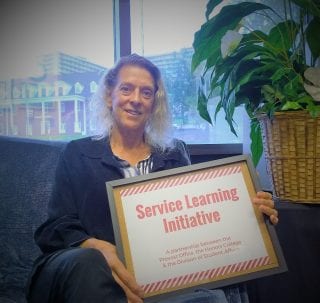Meet Professor Leah Jean Henry! She is an associate professor of Community Health Promotion at Health, Human Performance and Recreation, College of Education and Health Professions. For the past years, […]
Meet Professor Leah Jean Henry! She is an associate professor of Community Health Promotion at Health, Human Performance and Recreation, College of Education and Health Professions.
For the past years, she has been supervising Public Health Internship which has recently been formally designated as service learning. The essence of a public health professional is to try to improve the health of the individuals and the communities. By designating this course as service learning, Dr. Henry wants to make it more clear for the students that what they are doing truly benefits the community or the community partner. Also, through service learning course, the students can track their service hours and get them acknowledged and recognized.
By doing service learning activities in public health setting, students will have the opportunity to complete public health tasks and activities that are needed by the agency. The community need is identified by the agency because that is what they do on a regular basis, but then the agency and student, for each intern, together will identify the best match between the student’s knowledge, skills, and interests and the need of the agency. The students know their own talent, experience and professional development needs, and they will sit with the agency to match with what their interest, abilities, and needs are. Although most of the community partners for this internship are public health agencies, some are not technically public health agencies but must have at least some focus or aspect of public health in their activities such as health educational program and character building.
Public Health Internship provides manuals that guide the students in making their initial contacts and how to conduct themselves and work throughout. At the beginning of the semester, the students also have to attend a mandatory 3-hour orientation that talks about policy, communication skills, professionalism, mutually beneficial concept of service learning, balanced relationship between the agency and the student, etc. This training helps ensure that both students and agency would contribute in a more meaningful way. The first thing the students do is set up a work plan. They have monthly time logs and tasks that reflect what they have done. In the middle of the semester, they will have progress update that asks them to look back on their work plan and see how much they have accomplished in the first half of the semester and what they will still need to do. At the end, they will have a final report with reflections on their professional development, relationship with the agency, attainment of their goals. They will also be asked a set of questions that assess the agency itself, such as how good that match was, how well the agency does in supporting their professional development, what the students gain and what the agency gains, what challenges they face and how they overcome the challenges, etc.
Lastly, this internship would also help students develop their communication skills by engaging and interacting with community clients, administrators, and other public health professionals.
